After thoroughly analyzing Death Note, we've crafted a list of the ten best episodes. In 'Rebirth', we see Light Yagami's disillusionment and taste for power, setting the thrilling stage. 'Tactics' highlights Light's strategic brilliance. 'Overcast', showcases the intricacies of Light's character, while 'Assault' intensifies the tension between Light and L. 'Frenzy' stands out for its strategic, high-tension chess game, and 'Silence' delves into regret and sacrifice. Finally, the concluding episode underscores the fleeting nature of power and the consequences of unchecked ambition. Intrigued? There's plenty more intrigue to unpack in each episode.
Key Takeaways
- 'Rebirth' and 'Tactics' episodes set the stage with high-stakes decisions and strategic prowess of Light Yagami.
- 'Overcast' and 'Assault' intensify power dynamics, unfolding Light's audacious brilliance and manipulative nature.
- 'Wager' and 'Matsuda' showcase suspenseful strategy and narrative shift, with Matsuda's development disrupting the status quo.
- 'Frenzy' and 'Silence' episodes delve into heightened tension, strategic maneuvering, and intricate dynamics of regret and sacrifice.
- Final episode concludes with Light's downfall, Ryuk's impact, and a powerful message about unchecked ambition and impermanence of power.
Episode 1: "Rebirth" Breakdown
In our exploration of 'Rebirth', the inaugural episode of Death Note, we're immediately drawn into a world of moral ambiguity and high-stakes decision making. Our initial impressions are of a show that's not afraid to challenge us, to make us question what we'd do in the shoes of its characters.
Speaking of characters, the introductions are masterful. Light Yagami, our protagonist, is shown to be brilliant, but disillusioned, his moral compass skewed by the monotony of his life. The Death Note itself, a powerful tool that can kill with just a name and a face, offers a tantalizing taste of power.
And then we meet Ryuk, the Shinigami, whose own boredom sparked this dangerous game. Together, they set a thrilling stage for the episodes to come.
Dissecting Episode 5: "Tactics"

Delving into the fifth episode, 'Tactics', we're hit with a dramatic shift in the narrative as Light Yagami's strategic prowess starts to take center stage. His manipulation is both chilling and enthralling, demonstrating the lengths he's willing to go to maintain control. L's deduction, on the other hand, showcases his uncanny ability to piece together the most elusive of clues, keeping us riveted.
| Scene | Emotion Evoked |
|---|---|
| Light's Manipulation | Awe and fear |
| L's Deduction | Intrigue and respect |
| Power Play | Excitement |
| Unforeseen Consequences | Shock |
| Final Showdown | Anticipation |
We dissect the tactics, marvel at the cunning, and brace ourselves for the inevitable fallout. The game of cat and mouse has escalated, and we're left craving more.
Episode 7: "Overcast" Detailed Review
Shifting gears to episode 7, 'Overcast', we find ourselves drawn into a stormy narrative where the complexities of Light Yagami's character begin to unfold with remarkable depth.
The 'Overcast' symbolism is pervasive, ingeniously depicting the looming danger and turbulence in Light's mind as he grapples with his darker side. This episode also showcases Light's audacious brilliance, his calculated moves a testament to his strategic acumen.
The character development is exemplary, revealing the transformation of Light from a righteous student to a cold, cunning manipulator. Our admiration for Light's intellect is tinged with a creeping fear of his capacity for ruthlessness.
This episode, undoubtedly, elevates the power dynamics to new heights, leaving us craving for more.
Examination of Episode 11: "Assault"
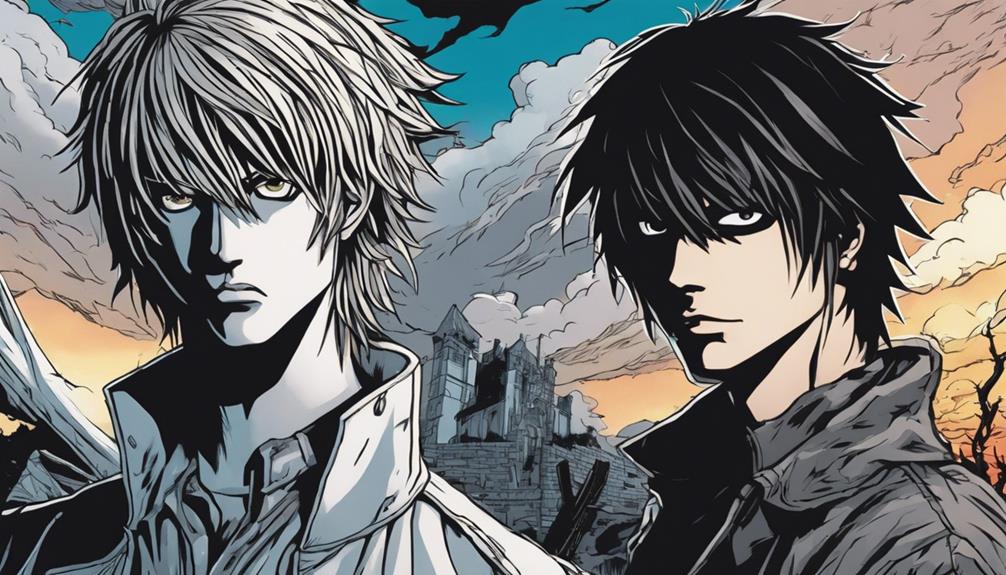
Bearing the weight of the turbulence seen in 'Overcast', we now turn our attention to episode 11, 'Assault', a pivotal chapter that further intensifies the power play. In this episode, we witness Light's strategy taking shape as he cunningly manipulates circumstances to his advantage. Concurrently, L's suspicions about Light grow, pushing the narrative to a gripping climax.
To create imagery, we've compiled a table summarizing crucial elements:
| Element | Description |
|---|---|
| Plot Evolution | Light's Strategy unfolds, L's Suspicions mount |
| Character Development | Light becomes more manipulative; L's paranoia increases |
| Power Dynamics | A shift of power from L to Light |
| Climax | The tension between Light and L reaches its peak |
| Impact | Light's strategic moves leave a lasting impression; L's suspicions create an air of suspense |
These elements highlight the power dynamics and character development in 'Assault', making it a remarkable episode.
Episode 15: "Wager" Insight
Diving into the depths of Episode 15, 'Wager', we're confronted with a masterful blend of suspense and strategy, painting a vivid picture of the ongoing intellectual duel between Light and L.
L's strategy in this episode is audacious and risky, yet keenly astute; he wagers on his hunch about Light being Kira, testing his opponent's mettle. Meanwhile, Light's decision to maintain his calm demeanor, despite the mounting pressure, further highlights his cunning nature. Their contrasting approaches make the episode a power-packed showdown.
The script brilliantly interweaves the characters' mental gymnastics into a tense narrative, keeping us on tenterhooks. It's a chessboard of manipulation and counter-maneuvers, where each move could lead to victory or doom. 'Wager' is a testament to the power of strategy, conviction, and courage.
Deep Dive Into Episode 19: "Matsuda"
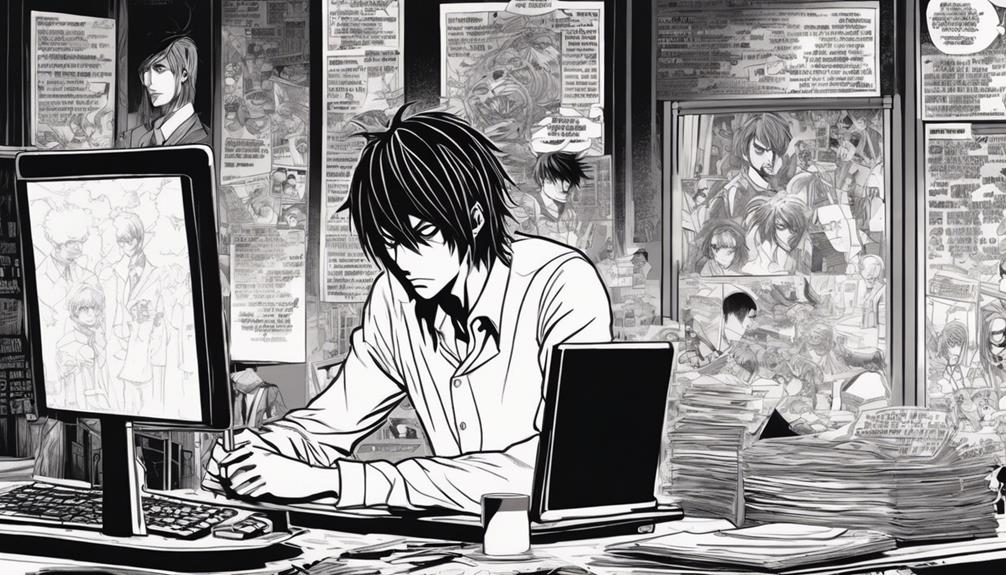
Continuing our exploration, we now turn our focus to Episode 19, 'Matsuda', an episode that presents a significant shift in perspective and tone. We're privy to Matsuda's development, as he moves from a seemingly naive detective to a character of substance. It's a power play that's both surprising and intriguing. His growth is symbolic, representing a turning point in the narrative.
The symbolism in Episode 19 is potent, showing that even the seemingly insignificant can wield power. Matsuda's actions disrupt the status quo, challenging our perception of him. He's no longer a mere pawn but a game-changer. This episode masterfully underscores the idea that power isn't just about control, but also about adaptability and growth. Thus, 'Matsuda' stands out for its unique tone, depth, and narrative shift.
Episode 23: "Frenzy" Review
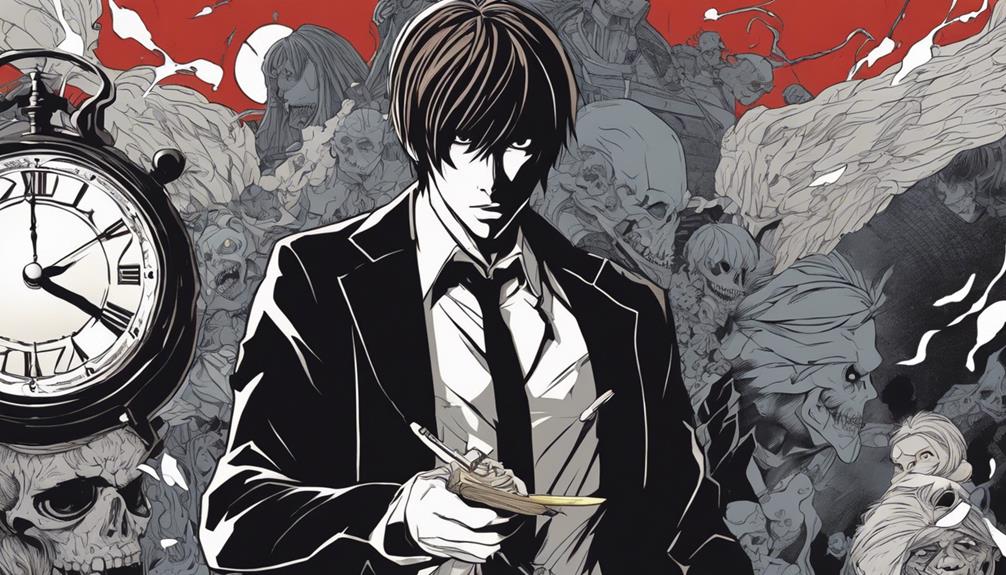
Shifting gears, we now plunge into the chaotic whirlpool that's Episode 23, 'Frenzy', a showcase of heightened tension and strategic maneuvering that leaves us on the edge of our seats.
The aptly titled 'Frenzy' symbolism is evident in the escalating pace, the heightened stakes, and the frenetic chess game between Light and L. Light's deception is masterful, a testament to his cunning and relentless pursuit of power. His manipulation of the task force, his exploitation of Misa's devotion, and his orchestration of the Yotsuba Group's downfall, all speak to his Machiavellian tactics.
This episode is a testament to Light's audacious power plays and the spiralling chaos that ensues. It's a frenzied mix of tension, strategy, and deception, making 'Frenzy' a standout in the Death Note saga.
Analyzing Episode 25: "Silence"
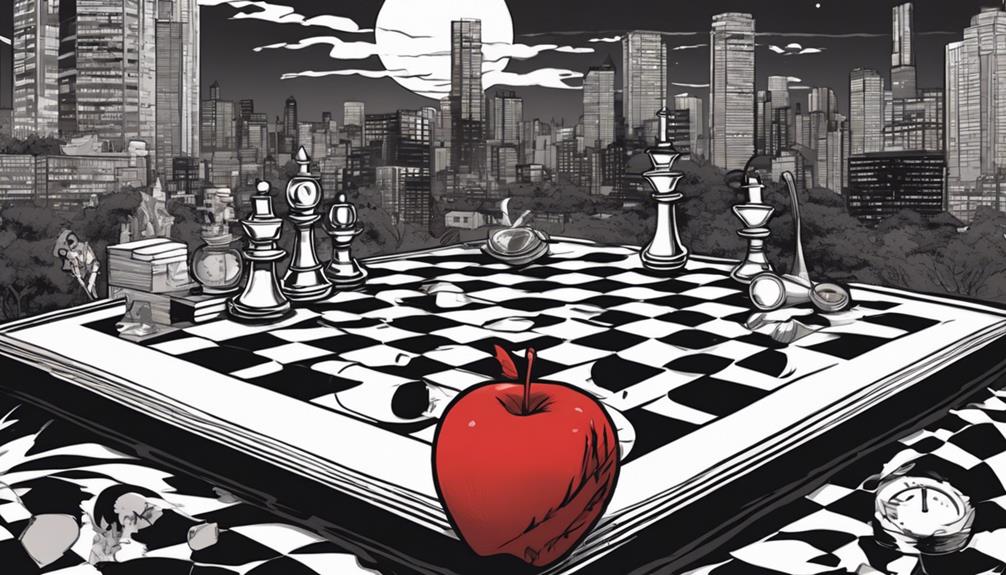
We now turn our attention to Episode 25, 'Silence', a poignant chapter in the Death Note series that delves into the intricate dynamics of regret, sacrifice, and unspoken emotions. This episode masterfully unravels L's predictions, offering a glimpse into his brilliant, yet tragic, mind. His foresight, however, does little to protect him from Kira's strategy, a ruthless game that leaves no room for hesitation.
'Silence' encapsulates the ensuing power struggle, making us question the morality of their actions. We see Kira manipulating circumstances with a chilling precision, while L's countermoves reflect a desperate, yet futile, attempt at justice. This episode, filled with unexpected turns, showcases the psychological warfare at its peak, leaving us craving for more.
Episode 30: "Justice" Breakdown
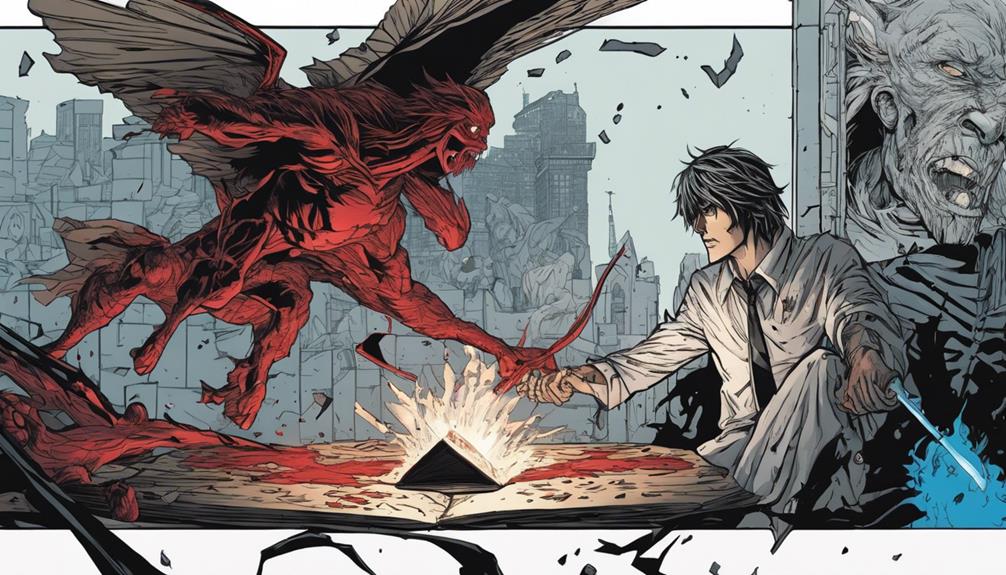
Diving into episode 30, 'Justice', we find ourselves tangled in a web of deceit as the narrative takes a deep dive into the concept of justice, pushing the boundaries of what we've come to know in the Death Note series. 'Justice' symbolism is rife, pushing viewers to question their own morality. Meanwhile, Light's manipulation reaches new heights.
To further engage you, we've prepared a table below:
| Key Scene | Analysis |
|---|---|
| Light's confession | Reveals the depth of his manipulation |
| 'Justice' speech | Symbolises the shaking of societal norms |
| Misa's allegiance | Questions loyalty in the face of injustice |
| Near's strategy | Embodies a cold, calculated approach |
| Final confrontation | A powerful display of Light's control |
The episode forces our hand, making us question, can justice ever be manipulated?
Final Thoughts on Episode 37: "New World"
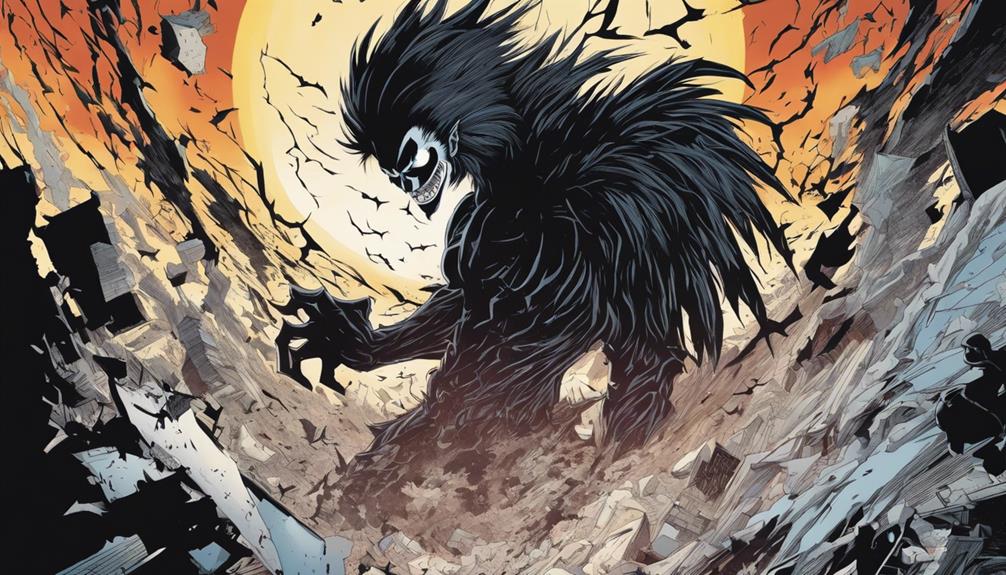
As we step into the realm of 'New World', the final episode of Death Note, it's impossible not to feel the weight of the narrative's culmination. We witness Light's downfall, a spectacle of failed arrogance and desperation. Ryuk's final act, a chilling reminder of the series' underlying theme: power's impermanence.
To paint a picture:
- Light's last stand, as he clings to his failing plan.
- Ryuk's detachment, a stark contrast to Light's desperation.
- The palpable tension during the final confrontation.
- The sudden, deafening silence as Light's reign ends.
- Ryuk's final act, sealing the series with a cold touch of inevitability.
It's a powerfully crafted conclusion, underscoring the folly of unchecked ambition and the fleeting nature of power.
Frequently Asked Questions
How Are the Character Dynamics of Light and L Explored Throughout the Series, Beyond Just the Specified Episodes?"
We've observed Light's manipulation and L's deduction skills intensify throughout the series. Their continual power struggles, though complex, highlight their superior intellect and relentless determination. It's a thrilling chess match we can't help but marvel at.
What Is the Overall Reception and Critical Acclaim of Death Note in the Anime Community?"
We've analyzed the anime adaptation reception, and it's clear: Death Note's popularity is unparalleled. It's become a mighty titan, an emblem of power in the anime community, critically acclaimed for its complex characters and riveting storyline.
Are There Any Significant Plot Differences Between the Death Note Manga and the Anime Adaptation?"
We've noticed some significant differences between the Death Note manga adaptation and its anime counterpart. These changes, though not drastically altering the plot, give us unique perspectives on the characters and their actions.
What Social and Philosophical Themes Are Prevalent in Death Note, and How Do They Impact the Storyline as a Whole?"
We're delving into Death Note's deep pool of moral ambiguity and power corruption. These themes shape the storyline, forcing us to question societal norms and the intoxicating, often destructive influence of absolute power.
What Other Works Has Tsugumi Ohba, the Creator of Death Note, Been Involved In?"
We've delved into Ohba's creative process and influence on the manga industry. Besides Death Note, he's penned Bakuman and Platinum End, demonstrating a unique storytelling prowess that's reshaped manga's narrative possibilities.
Conclusion
Our journey through Death Note's top episodes has been a thrilling roller-coaster. Remember the chills we felt during 'Silence', the 25th episode? It was like watching a master chess player making a final, fatal move.
Each episode we've dissected has served to deepen our appreciation for this intricate anime, transforming our viewing experience entirely. Let's continue to explore and analyze such masterpieces, their layers of complexity shaping our understanding and emotions in unimaginable ways.
Episode 5 was overrated! Episode 7 is where the real actions at. Agree?
Episode 5 overrated, Episode 7 underrated. Whos with me? Lets debate!
Episode 5 overrated, Episode 7 underrated – whats your take on this twist?
Episode 1 overrated, Episode 7 underrated – thoughts? #DeathNoteDebate #ControversialOpinions
Episode 1 was overrated! Episode 7 deserves more praise and analysis. Agree?
Sorry, but I have to disagree. Episode 1 set the foundation for the entire series and introduced key characters and themes. Episode 7 may have its strengths, but it doesnt overshadow the importance of the first episode. Each episode deserves recognition for its unique contributions to the storyline.
Episode 7 was overrated. Episode 5 deserves more love and recognition!
Episode 1 was overrated! Episode 5 had the real intensity, hands down.
Episode 5 was overrated. Episode 7 deserves more love and analysis! #TeamOvercast
Episode 7 is overrated! Tactics is where the real genius lies. Discuss.
Interesting breakdown, but arent we overlooking the significance of episode 25s plot twist? And shouldnt the psychological depth in Overcast be further explored? Just a thought.
Though Im with you on most of these, Im puzzled as to why Tactics made the top 10. Did we watch the same show? Ls genius plan in Overcast surely outshines any strategy in Tactics.
Interesting breakdown, but dont you think Tactics deserves a higher place in the ranking? The plot twists in that episode were absolutely mind-blowing. Also, why no mention of Episode 25?
Just finished reading this breakdown and I gotta say, Im not convinced with the high praise for Tactics. Sure, it’s a pivotal episode, but I feel its overrated. The cat and mouse game between Light and L were way more intense in Overcast. Anyone else feel the same or am I alone on this one?
Couldnt agree more! Overcasts tension was palpable, Tactics felt overhyped. Were not alone in this.
Interesting read, but I gotta say, I disagree with Overcast being in the top 10. For me, it was too slow and lacked the tension that makes Death Note thrilling. Also, where’s the love for Execution? It defines the whole series! Maybe its time to reevaluate the criteria for best episodes?